Juice Tips and Tricks
How Long Does Lemon Juice Last After Expiration Date

As someone who often uses lemon juice in my cooking and baking, I’ve often wondered about its shelf life. Is it really no good after the expiration date on the label, or is it still okay to use? To satisfy my curiosity, I set out to investigate how long lemon juice lasts and how to tell if it’s gone bad.
Understanding expiration dates is important when it comes to food safety. While some products may be safe to consume after their expiration date, others can pose a health risk. Lemon juice is no exception.
In this article, I’ll be exploring the shelf life of lemon juice, what signs to look for when it goes bad, how to properly store it, and alternative uses for expired lemon juice. So, let’s get started!
Key Takeaways
- Lemon juice expiration dates indicate quality, not safety.
- Proper storage in a tightly sealed container in the fridge can prolong the shelf life of lemon juice.
- Signs of spoilage in lemon juice include changes in color and off odors.
- Alternative uses for expired lemon juice include using it as a natural cleaner or insect repellent.
Understanding Expiration Dates
Did you know that understanding food labeling and expiration dates is crucial when it comes to knowing how long your food and beverages will last? Many people are unaware of the common misconceptions about expiration dates. For instance, some people believe that expiration dates indicate the safety of the food or drink, while others think that the expiration date is the last day the product is edible.
In reality, an expiration date is simply an estimate of how long the product will maintain its quality, not its safety. It’s also important to note that there are different types of expiration dates, such as sell by dates, best before dates, and use by dates.
While sell by dates are used to indicate when the product should be removed from store shelves, best before dates are used to indicate the point at which the product will be at its best quality. Use by dates, on the other hand, indicate the date by which the product should be consumed to ensure its safety.
Understanding the difference between these dates can help you make informed decisions about the food and beverages you consume. With this in mind, let’s dive into the shelf life of lemon juice.
Shelf Life of Lemon Juice
The shelf life for expired lemon juice can be shorter than expected. Factors affecting the shelf life of lemon juice include the type of packaging, storage conditions and the presence of preservatives. The acidity of lemon juice can also affect its shelf life, as it can promote the growth of bacteria and mold. Generally, unopened lemon juice can last up to a year past its expiration date, while opened lemon juice can last up to 6 months in the refrigerator.
There are ways to extend the shelf life of lemon juice, such as storing it in the refrigerator at a consistent temperature of 40°F or below. It is also important to keep the container tightly sealed to prevent air and moisture from getting in. Adding preservatives such as citric acid or ascorbic acid can also help to prolong the shelf life of lemon juice. By following these precautions, you can ensure that your lemon juice remains safe to consume for longer periods of time. In the next section, we will discuss the signs of spoilage to look out for when consuming expired lemon juice.
Signs of Spoilage
You may notice certain changes in the quality of your expired lemon juice that indicate it’s no longer safe to consume. One of the signs of spoilage is the color changes in the lemon juice, which may turn darker or cloudier.
Another indication of spoilage is the presence of off odors, which can range from sour to rancid. If you notice any of these changes, it’s best to discard the lemon juice immediately.
Additionally, other factors, such as exposure to air, light, and heat, can also affect the quality of lemon juice and cause spoilage. It’s crucial to store lemon juice properly in a cool, dry place away from direct sunlight to extend its shelf life.
In the next section, we’ll discuss the appropriate methods for storing lemon juice to ensure that it remains fresh and safe for consumption.
Proper Storage
Make sure to store your lemon juice properly in order to keep it fresh and avoid any unpleasant surprises when you go to use it. Lemon juice can be stored in various ways depending on personal preference and the amount of juice left.
One of the most common ways is to store it in a glass bottle or jar with an airtight lid. This method helps to prevent exposure to air and light, which can cause the juice to spoil. It’s also recommended to store the juice in the fridge to keep it cool and prevent bacterial growth.
Another way to store lemon juice is to freeze it. This method helps to preserve the juice for a longer period of time. Simply pour the juice into an ice cube tray and freeze. Once the cubes are frozen, transfer them into a freezer bag and label with the date. This way, you can simply take out the number of cubes you need and thaw them in the fridge or at room temperature. It’s important to note that frozen lemon juice may have a slightly different texture or flavor when thawed, but it’ll still be safe to consume.
Now that we know how to properly store lemon juice, let’s move on to the different types of lemon juice available in the market.
Types of Lemon Juice
Get ready to explore the different varieties of lemon juice, so you can choose the best one for your recipe! When it comes to lemon juice, there are two main types: fresh and bottled. Fresh lemon juice is squeezed directly from the fruit and has a bright, tangy flavor. On the other hand, bottled lemon juice goes through processing and often has preservatives added to extend its shelf life. The flavor of bottled lemon juice can be slightly muted compared to fresh lemon juice, but it is more convenient to use and has a longer shelf life.
In addition to fresh vs bottled, there is also the choice between organic and conventional lemon juice. Organic lemon juice is made from lemons that are grown without the use of synthetic pesticides or fertilizers. This results in a more natural product, but it can also be more expensive. Conventional lemon juice, on the other hand, is made from lemons that may have been treated with synthetic chemicals. However, it is often less expensive than organic lemon juice. Understanding the differences between these types of lemon juice can help you choose the best one for your recipe and personal preferences. Now, let’s move on to the next section and explore some common uses for lemon juice.
Uses for Lemon Juice
Using lemon juice in your cooking and baking can add a bright, tangy flavor that can enhance the taste of many dishes. Lemon juice is not only delicious, but it also has numerous health benefits. It’s a rich source of vitamin C, which is essential for a healthy immune system. Additionally, lemon juice contains antioxidants that can help reduce the risk of chronic diseases such as heart disease and cancer.
When it comes to recipes, lemon juice is a versatile ingredient. It can be used to add flavor to marinades, dressings, sauces, and even desserts like lemon bars and lemon meringue pie. Lemon juice can also brighten the flavor of vegetables and seafood dishes. Adding a splash of lemon juice to roasted vegetables or grilled fish can make a big difference in taste.
Moving on to the next section about safety concerns, it’s important to note that using expired lemon juice can be harmful to your health.
Safety Concerns
It’s crucial to consider the safety concerns around consuming expired lemon juice, isn’t it? Lemon juice, like any other food or drink, can spoil and become a breeding ground for harmful bacteria. When lemon juice goes past its expiration date, it can cause food poisoning if consumed. This occurs because bacteria grow and multiply, producing toxins that can make us sick.
To better understand the risks associated with consuming expired lemon juice, it’s helpful to look at the following table:
| Condition of Lemon Juice | Bacterial Growth | Risk of Food Poisoning |
|---|---|---|
| Fresh, unopened | None | Low |
| Fresh, opened | Slow | Moderate |
| Expired, unopened | Slow | Moderate |
| Expired, opened | Rapid | High |
As seen in the table, the risk of food poisoning increases as lemon juice ages and is exposed to air and other contaminants. Therefore, it’s best to avoid consuming expired lemon juice to prevent any health issues. In the next section, we will discuss alternative uses for expired lemon juice.
Alternative Uses for Expired Lemon Juice
You might be surprised to learn about the various ways you can repurpose expired lemon juice instead of throwing it away. One of the repurposing tips is to use it as a natural cleaner. The acidic properties of lemon juice make it an effective cleaning agent for surfaces such as cutting boards, countertops, and even stainless steel appliances. Simply mix the expired lemon juice with some baking soda and water, and you’ve got a natural and effective cleaning solution for your home.
Another creative idea is to use expired lemon juice in your garden. Lemon juice can be used as a natural insect repellent for your plants, keeping pesky bugs away without the use of harmful chemicals. It can also be used as a natural fertilizer, providing your plants with the necessary nutrients they need to thrive.
By repurposing your expired lemon juice, you can not only reduce waste but also contribute to a more sustainable lifestyle.
As for disposing of expired lemon juice, there are proper ways to do so that’re eco-friendly.
Disposing of Expired Lemon Juice
So, to recap the key points on the shelf life of lemon juice, it’s important to note that the expiration date isn’t a hard and fast rule. Lemon juice can last beyond its expiration date if stored properly and if there are no visible signs of spoilage.
However, if the juice has an off smell or appearance, it should be disposed of.
In my final thoughts, it’s always better to err on the side of caution and not consume expired lemon juice.
Recap of Key Points
Alright folks, let’s quickly summarize the important takeaways about the shelf life of expired lemon juice before it goes bad and becomes undrinkable. Despite the expiration date, lemon juice can still be consumed beyond that date if stored properly. However, it is important to note that the quality and taste of the juice may deteriorate over time. Additionally, there are certain recipes that can make use of expired lemon juice, such as marinades or salad dressings.
To help you better understand the shelf life of lemon juice, here is a table that outlines the key points:
| Shelf Life | Storage | Quality |
|---|---|---|
| Expiration date | Refrigerator | Best |
| 1-2 months after expiration | Refrigerator | Good |
| 6-12 months after expiration | Freezer | Good for cooking, but not for drinking |
It is important to note that consuming expired lemon juice beyond the recommended shelf life may pose health risks, so it is best to use your judgement and discretion when deciding whether or not to consume it. In the next section, we will discuss some final thoughts on the shelf life of lemon juice.
Final Thoughts on Lemon Juice Shelf Life
Now that we’ve covered the details about the shelf life of expired lemon juice, let’s wrap up with some final tips to keep in mind when using lemon juice.
Firstly, always store lemon juice in a tightly sealed container in the fridge to prolong its shelf life. Secondly, if you find yourself with an abundance of lemons, consider freezing the juice for later use. Lemon juice can be frozen for up to six months, and it’s a great way to ensure you always have fresh lemon juice on hand.
Additionally, it’s worth noting that lemon juice has many benefits beyond cooking. Lemon juice is packed with vitamin C, which can boost your immune system and improve skin health. Drinking lemon water can also aid in digestion and provide a natural energy boost.
So, next time you’re considering throwing out that expired lemon juice, remember that there are many ways to use it and reap its benefits.
Frequently Asked Questions
Can expired lemon juice make you sick?
Expired lemon juice can pose risks such as bacterial growth and spoilage. Safe alternatives include using fresh lemon juice or purchasing pre-packaged, unexpired lemon juice. It is important to always check expiration dates before consuming any food or beverage.
Can you freeze lemon juice to extend its shelf life?
Yes, freezing lemon juice is an effective method for preserving citrus juices. It can extend its shelf life for up to 6 months. Simply pour the juice into an airtight container and leave some space for expansion. Thaw in the refrigerator before use.
Is fresh lemon juice better than bottled lemon juice?
Comparing fresh and bottled lemon juice, the former has higher nutritional value due to the absence of preservatives. While bottled juice is convenient, nothing beats the taste and health benefits of freshly squeezed lemon juice.
Can expired lemon juice be used for cleaning or beauty purposes?
When lemon juice expires, it can still be used for cleaning and beauty purposes. It’s a natural disinfectant and can brighten skin and hair. Consider mixing with olive oil for a DIY furniture polish or adding to bathwater for a refreshing soak.
How can you tell if lemon juice has gone bad if there is no expiration date?
Like a detective, I scrutinize the lemon juice’s texture, color, and scent to see if it’s still good. I also check for mold, cloudiness, and off-flavors. Properly storing lemon juice in the fridge can extend its shelf life.
Conclusion
Well, it turns out that expired lemon juice can actually be useful in a variety of ways, despite its inability to be consumed. As I mentioned earlier, it can be used as a cleaning agent, insect repellent, and even as a natural hair lightener.
So, while it may seem counterintuitive to hold onto a past-its-prime bottle of lemon juice, it could actually come in handy down the road. Of course, it’s always important to exercise caution and proper storage techniques when it comes to any food or beverage item.
And while I wouldn’t necessarily recommend using expired lemon juice in your next batch of lemonade, it’s good to know that there are alternative ways to make use of it. So, next time you find yourself staring at an old bottle of lemon juice in your fridge, remember that there’s more to it than just its expiration date.
Cindy thoroughly researches juicing trends, techniques, and recipes to provide readers with practical advice and inspiration. Her writing style is accessible, engaging, and designed to make complex concepts easy to understand. Cindy’s dedication to promoting the advantages of juicing shines through her work, empowering readers to make positive changes in their lives through the simple act of juicing.
Juice Tips and Tricks
How to Make Aloe Vera Juice Taste Better

Tired of the strong flavor of aloe vera juice? No problem, we’ve got the answer for you.
In this article, we’ll share some tips and tricks to make your aloe vera juice taste better. We have tried and tested various methods to enhance the flavor without compromising the health benefits.
From choosing the right juice to adding natural sweeteners and infusing with fruits and herbs, we’ve got all the information you need to transform your aloe vera juice into a delightful and refreshing beverage.
Let’s dive in!
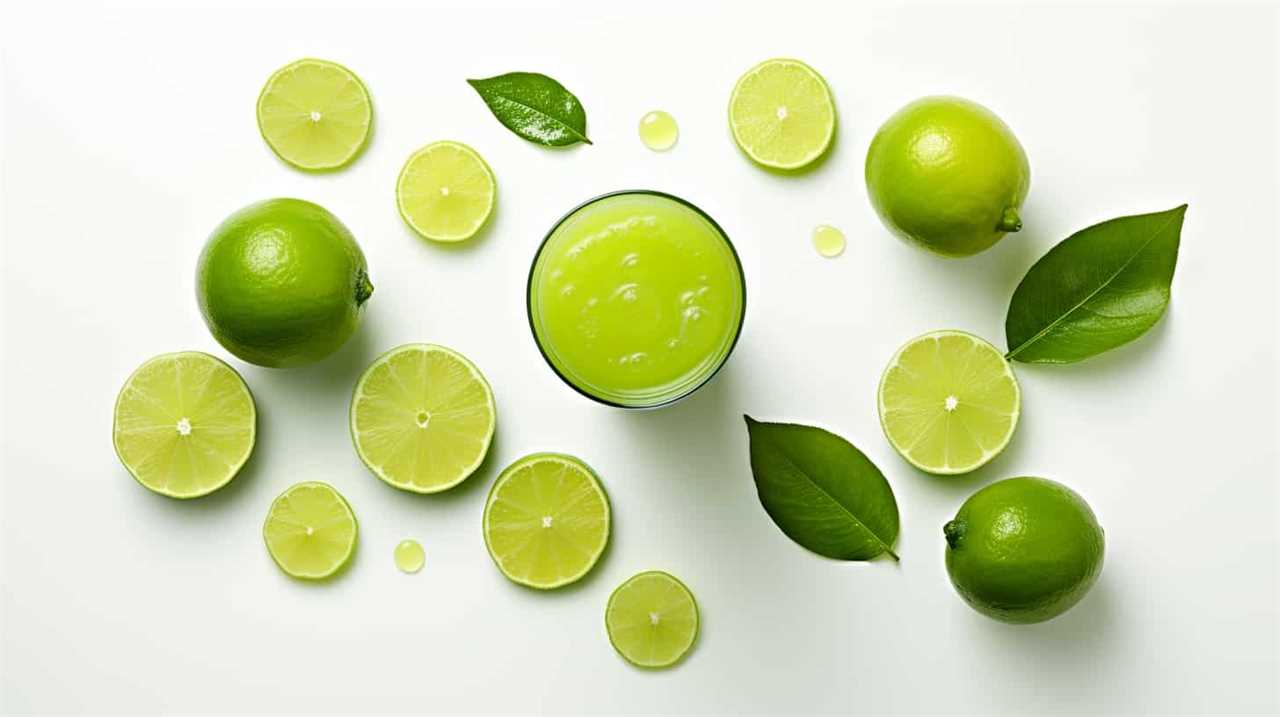
Key Takeaways
- Choose a reputable brand of aloe vera juice that prioritizes quality and uses organic, pure aloe vera.
- Avoid brands that contain added sugars or artificial ingredients.
- Use natural sweeteners like honey, agave syrup, or stevia to enhance the taste of aloe vera juice.
- Experiment with adding fruits, herbs, and other juices to create unique flavor combinations and enhance the health benefits of aloe vera juice.
Choosing the Right Aloe Vera Juice
We can enhance our experience with aloe vera juice by selecting the right brand and type for our preferences. When it comes to finding a reputable brand, it’s important to do some research and read reviews from other consumers. Look for brands that prioritize quality and use organic, pure aloe vera without any added sugars or artificial ingredients. Understanding the health benefits of aloe vera juice is also crucial in making the right choice. Aloe vera is known for its soothing properties, aiding digestion, promoting skin health, and boosting the immune system. By choosing a high-quality brand, we can ensure that we’re getting the maximum benefits from our aloe vera juice.
Now that we know how to choose the right brand, let’s move on to the next step of adding natural sweeteners.
Adding Natural Sweeteners
To enhance the flavor of our aloe vera juice, we can add natural sweeteners such as honey or agave syrup. Using alternative sweeteners not only adds sweetness but also brings unique flavors to the juice. Here are some options to consider:
- Stevia: A natural sweetener derived from the Stevia plant, it’s a zero-calorie alternative to sugar.
- Maple Syrup: This natural sweetener adds a rich and earthy flavor to the aloe vera juice.
- Dates: Pureed dates can be used to sweeten the juice while also providing essential nutrients like fiber.
In addition to using alternative sweeteners, we can enhance the flavor of aloe vera juice by adding spices and extracts. Cinnamon, ginger, or vanilla extract can add warmth and depth to the taste. By experimenting with different combinations of these natural sweeteners, spices, and extracts, we can create a flavor profile that suits our preferences.

Now, let’s move on to the next section and learn how to infuse aloe vera juice with fruits and herbs to further enhance its taste.
Infusing With Fruits and Herbs
As we explore ways to make our aloe vera juice taste better, one option to consider is infusing it with fruits and herbs. Creating unique aloe vera blends by adding fruits and herbs not only enhances the flavor but also adds a touch of freshness and complexity to the juice.
Fruits like strawberries, pineapple, or citrus can add a burst of sweetness, while herbs like mint, basil, or ginger can provide a subtle yet refreshing twist. Exploring the benefits of herbal infusions can also be beneficial for our health. For example, adding a few sprigs of lavender can promote relaxation and reduce stress. Additionally, infusing aloe vera juice with rosemary can aid digestion and boost the immune system.
Blending With Other Juices
Let’s try mixing aloe vera juice with different fruit juices to create delicious and refreshing blends. Blending aloe vera juice with other fruits not only enhances its taste but also adds nutritional benefits to your drink. Here are three fruit juices that you can mix with aloe vera juice:

- Orange juice: Combining aloe vera juice with orange juice not only adds a tangy flavor but also boosts your intake of vitamin C, which is essential for a strong immune system.
- Pineapple juice: Mixing aloe vera juice with pineapple juice creates a tropical blend that isn’t only refreshing but also helps in digestion. Pineapple contains bromelain, an enzyme that aids in breaking down proteins and promoting better digestion.
- Watermelon juice: Blending aloe vera juice with watermelon juice creates a hydrating and refreshing combination. Watermelon is rich in water content and contains electrolytes that can help replenish your body’s fluids.
Experimenting With Flavor Combinations
While we can try various flavor combinations with aloe vera juice, it’s important to find the right balance to enhance its taste. Experimenting with different flavors can’t only make the juice more enjoyable but also enhance its health benefits.
Aloe vera juice is known for its numerous health benefits, such as boosting digestion, promoting hydration, and supporting the immune system. By adding complementary flavors, we can create a refreshing summer drink that not only tastes great but also provides a nutritional boost.
Some popular flavor combinations include mixing aloe vera juice with citrus fruits like lemon or orange, adding a splash of coconut water for a tropical twist, or combining it with cucumber and mint for a refreshing and cooling effect.
Don’t be afraid to get creative and find the flavor combination that suits your taste buds best!

Frequently Asked Questions
Can I Use Store-Bought Aloe Vera Gel Instead of Fresh Aloe Vera for Making Juice?
Yes, you can use store-bought aloe vera gel instead of fresh aloe vera for making juice. However, it’s important to note that fresh aloe vera juice may have more health benefits due to its higher nutrient content.
How Long Can I Store Aloe Vera Juice in the Refrigerator?
Aloe vera juice can be stored in the refrigerator for up to a week. Refrigeration helps maintain the longevity and freshness of the juice, preserving its beneficial properties.
Can Aloe Vera Juice Help With Digestive Issues?
Aloe vera juice can potentially help with digestive issues when taken in appropriate dosages. However, it is important to note that there may be potential side effects. It is always best to consult with a healthcare professional before starting any new supplement regimen.
Can I Use Artificial Sweeteners Instead of Natural Sweeteners in My Aloe Vera Juice?
Using artificial sweeteners in aloe vera juice may affect its taste and potential health benefits. However, natural sweeteners like honey or stevia can enhance the flavor without compromising its nutritional value.

Is It Safe to Drink Aloe Vera Juice Every Day?
Drinking aloe vera juice daily can have numerous benefits, such as improving digestion and boosting the immune system. However, consuming it regularly may also lead to potential side effects like diarrhea or stomach cramps.
Conclusion
In conclusion, making aloe vera juice taste better is easy and enjoyable.
By choosing the right aloe vera juice and adding natural sweeteners, infusing with fruits and herbs, blending with other juices, and experimenting with flavor combinations, you can create a delightful and refreshing drink.
So go ahead and unleash your creativity in the kitchen, and transform your aloe vera juice into a sensational elixir that will transport your taste buds to paradise.
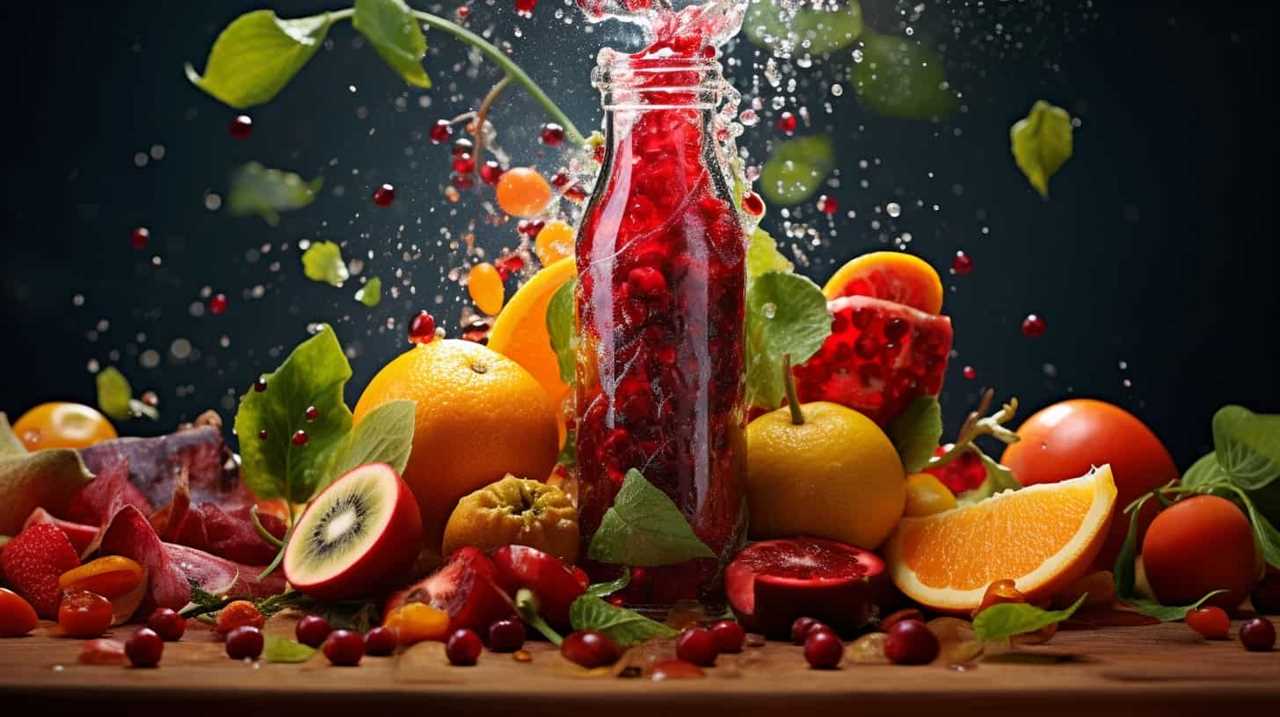
Susannah expertise lies in researching and compiling evidence-based content on juicing, nutrition, and overall health. She is committed to ensuring that The Juicery World offers accurate, up-to-date, and trustworthy information to empower readers to take control of their health. Susannah’s goal is to inspire individuals to embrace juicing as a way to nourish their bodies and live their best lives.
Juice Tips and Tricks
How to Make a Glass of Lemonade With Bottled Lemon Juice

Are you craving a cool glass of lemonade to quench your thirst? Look no further! Try out our perfect recipe using bottled lemon juice that will surely please your taste buds.
In this article, we’ll guide you through the process of creating a tangy and sweet concoction that will leave you feeling refreshed and satisfied.
So grab your ingredients and let’s get started on this delightful journey of serving ourselves and others a glass of pure lemony goodness.
Key Takeaways
- Consider the storage of the bottled lemon juice (dark glass or plastic bottles, protect from light exposure, check expiration date)
- Choose a suitable pitcher and fresh lemons for enhanced flavor
- Store the lemonade concentrate in the refrigerator to maintain freshness
- Adjust the sweetness and tartness to taste with sugar or more lemon juice, and experiment with different sweeteners or additional flavors.
Choosing the Right Bottled Lemon Juice
What are the key factors we should consider when selecting the right bottled lemon juice for our lemonade?

One important factor is how the lemon juice is stored. Look for bottles that are made of dark glass or plastic, as they help protect the juice from light exposure, which can degrade its quality. It’s also important to check the expiration date to ensure freshness.
Another benefit of using bottled lemon juice is convenience. It saves time and effort compared to squeezing fresh lemons. Additionally, bottled lemon juice provides consistent flavor, as the acidity levels are standardized.
When selecting a brand, consider reading reviews and checking for certifications, such as organic or non-GMO.
Gathering the Necessary Ingredients and Tools
How can we gather all the necessary ingredients and tools to make a glass of lemonade with bottled lemon juice?
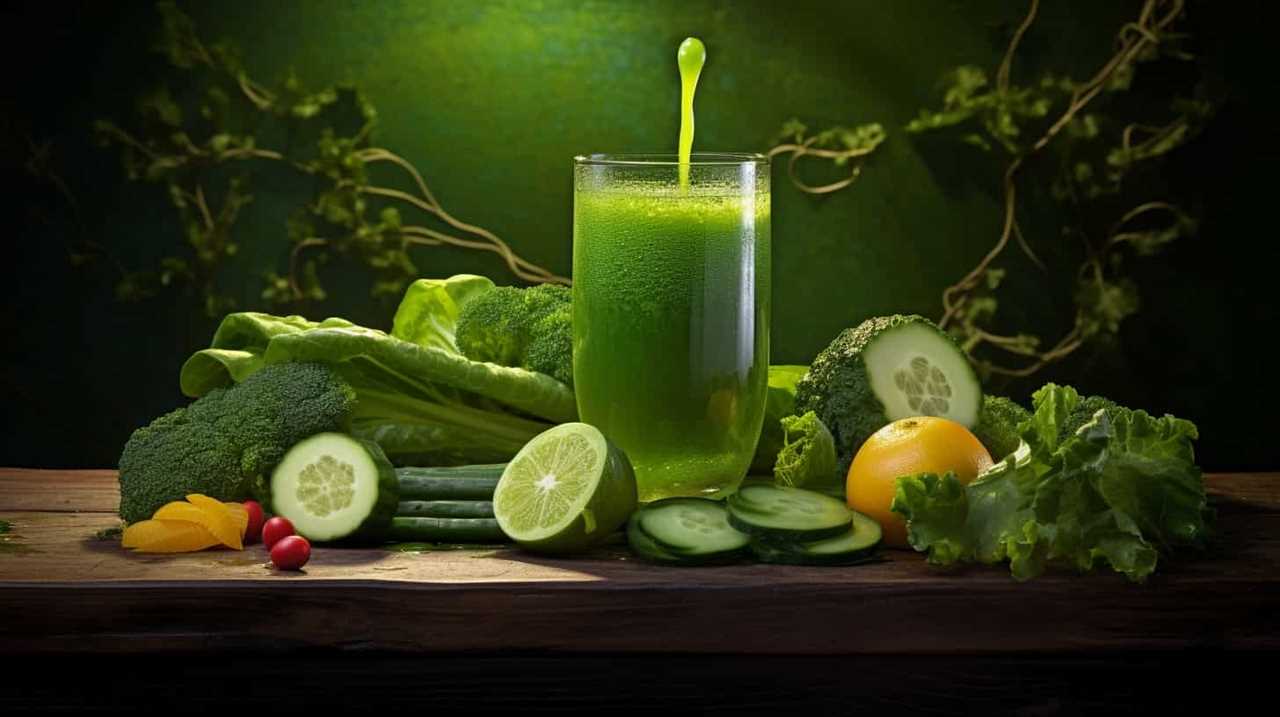
It’s important to start with the right pitcher. Look for a pitcher that’s made of glass or BPA-free plastic, as these materials won’t affect the taste of the lemonade. The pitcher should also have a lid or cover to keep the lemonade fresh and prevent spills.
Now, let’s talk about the lemons. While bottled lemon juice is convenient, using fresh lemons instead can elevate the flavor of your lemonade. Choose lemons that are firm and have a bright yellow color. Give them a gentle squeeze to ensure they’re juicy. To extract the juice, you’ll need a citrus juicer or a reamer. These tools make it easy to get every last drop of juice from the lemons.
Mixing the Lemonade Concentrate
To start mixing the lemonade concentrate, we’ll slowly pour the bottled lemon juice into the pitcher. It’s important to choose the right container for the lemonade concentrate. A pitcher with a lid or a tightly sealed container will help maintain the freshness and prevent any spills or leaks. Once the lemon juice is in the pitcher, we can move on to the next step of adding water and sweetener.
To ensure the lemonade concentrate stays fresh, it’s essential to store it properly. Keep the pitcher in the refrigerator to maintain its cool temperature and prevent any bacteria growth. If you have any leftover concentrate, transfer it to a smaller container with an airtight lid before refrigerating. This will help retain its flavor and prevent any contamination.

Now that we’ve mixed the lemonade concentrate, it’s time to adjust the sweetness and tartness to taste.
Adjusting the Sweetness and Tartness to Taste
We can adjust the sweetness and tartness of the lemonade to taste by adding more sugar or lemon juice, respectively. If you prefer a sweeter lemonade, simply add more sugar and stir until it dissolves completely. You can experiment with different sweeteners such as honey or agave syrup to find the perfect balance of sweetness.
On the other hand, if you want a tangier lemonade, add more lemon juice gradually, tasting as you go until it reaches your desired level of tartness.
Additionally, you can get creative with your lemonade by adding flavors like fresh mint leaves or a hint of lavender. These additions can elevate the flavor profile and create a more refreshing and unique experience.

Now that we’ve adjusted the sweetness and tartness of our lemonade, let’s move on to serving and enjoying your refreshing glass of lemonade.
Serving and Enjoying Your Refreshing Glass of Lemonade
Now let’s sit back, relax, and savor our refreshing glass of lemonade.
When it comes to serving and enjoying this delightful drink, there are a few techniques and garnishing options to consider.
Firstly, serving your lemonade chilled is essential for maximum enjoyment. Ensure that you have chilled glasses or add ice cubes to the glasses before pouring the lemonade.

To add a touch of elegance, you can garnish your lemonade with a slice of lemon on the rim of the glass. For an extra burst of flavor, you could also add a sprig of fresh mint or a few berries.
Remember to gently stir the lemonade before serving to evenly distribute the flavors.
Now, take a sip, feel the refreshing tang of lemon, and let the sweet and tart flavors dance on your taste buds.
Cheers!
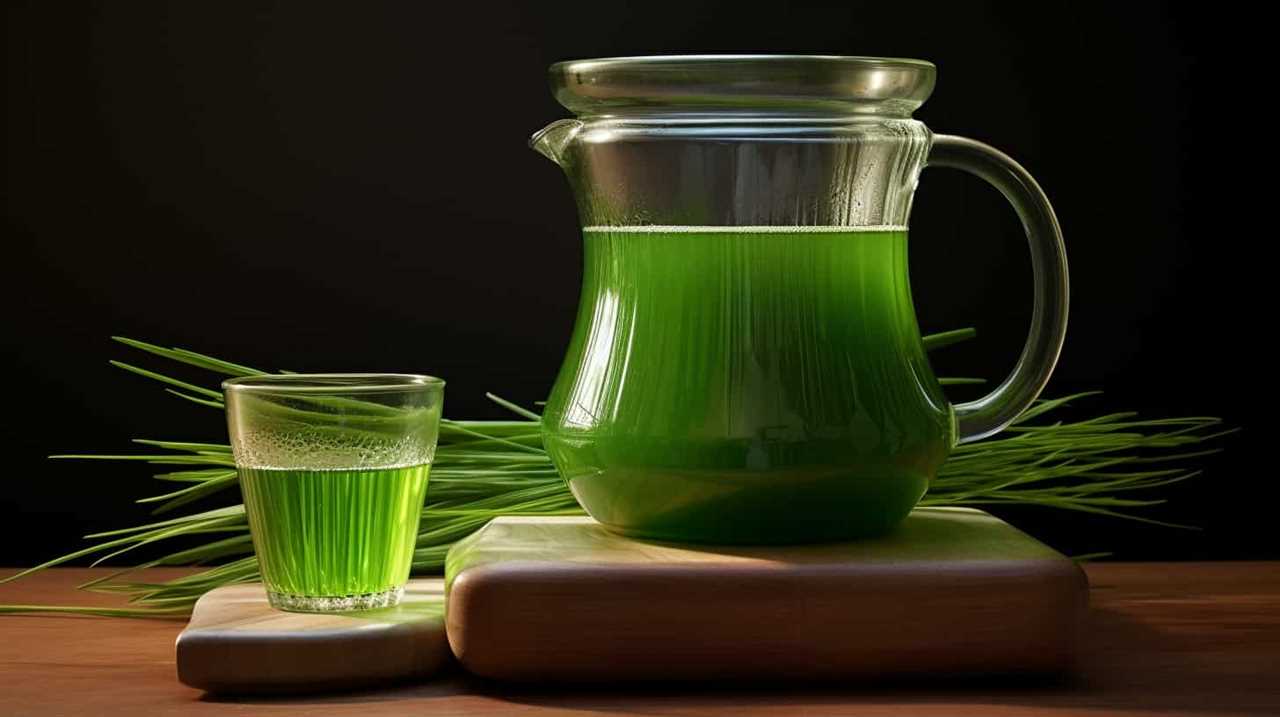
Frequently Asked Questions
Can I Use Fresh Lemons Instead of Bottled Lemon Juice?
Fresh lemons offer numerous benefits over bottled lemon juice. The taste of fresh lemons is unparalleled, providing a vibrant and tangy flavor. Incorporating fresh lemons into your lemonade will elevate its taste and give it a refreshing and authentic twist.
Can I Substitute Sugar With a Different Sweetener?
Substituting sweeteners in lemonade can enhance the flavor and offer health benefits. We’re knowledgeable about alternative sweeteners and can provide precise, detailed instructions on using them in place of sugar.
How Long Does the Lemonade Concentrate Need to Chill in the Refrigerator?
The chilling time for the lemonade concentrate in the refrigerator is typically around 1-2 hours. Using bottled lemon juice offers the benefit of convenience and consistent flavor for a refreshing glass of lemonade.
Can I Add Other Fruits or Flavors to the Lemonade?
Sure, we can definitely add different fruits or flavors to our lemonade. It’s a great way to experiment with unique flavors and create refreshing, personalized drinks. The possibilities are endless!

How Long Does the Lemonade Stay Fresh in the Refrigerator?
Lemonade made with bottled lemon juice can stay fresh in the refrigerator for about 5-7 days. To maximize shelf life, store it in an airtight container and keep it chilled.
Conclusion
And so, with a few simple steps and the right ingredients, a glass of refreshing lemonade is born.
Like a symphony of flavors dancing on your taste buds, this tangy elixir quenches thirst and brings joy on a hot summer day.
Just a sip transports you to a world of citrusy delight, where the sweetness and tartness blend harmoniously.

So go ahead, indulge in the art of lemonade-making and savor every drop of this sun-kissed nectar.
Cheers to the perfect glass of lemonade!
Susannah expertise lies in researching and compiling evidence-based content on juicing, nutrition, and overall health. She is committed to ensuring that The Juicery World offers accurate, up-to-date, and trustworthy information to empower readers to take control of their health. Susannah’s goal is to inspire individuals to embrace juicing as a way to nourish their bodies and live their best lives.
Juice Tips and Tricks
How to Know if Orange Juice Is Bad

We’ve all been in that situation before – reaching for a glass of orange juice and hesitating, unsure if it’s still okay to drink. Fear not! This article will give you the knowledge you need to determine for sure if your orange juice is still fresh or if it’s gone bad.
With a blend of scientific precision and practical tips, we’ll explore color changes, strange smells, off taste, texture changes, and mold or growth that may indicate spoilage.
Let’s dive in and serve ourselves a refreshing glass of certainty!
Key Takeaways
- Color changes in orange juice can indicate a loss of freshness and shelf life extension, but it doesn’t necessarily mean the juice is bad.
- Unusual or off-putting odors in orange juice, such as sour or fermented scents, can be a sign of poor quality.
- An off taste in orange juice, such as sour, bitter, or fermented flavors, suggests that the juice is spoiled.
- Texture changes in orange juice, such as pulp separation or a thicker consistency, can occur as the juice ages, so it’s important to consume it before the expiration date.
Color Changes in Orange Juice
We should be aware that color changes can indicate whether orange juice is bad.

When it comes to orange juice, color is a crucial factor to consider. As oranges are exposed to air, an oxidation process occurs, which leads to changes in color. Fresh orange juice has a vibrant orange hue, indicating its freshness and high nutritional value.
However, as time passes, the juice may undergo a color change, turning dull or brownish. This change in color is a result of the oxidation process, which affects the flavor and quality of the juice. It’s important to note that while a change in color doesn’t necessarily mean the juice is bad, it does indicate that the juice is losing its freshness and shelf life extension.
Therefore, it’s advisable to consume orange juice when it’s at its freshest, as indicated by its vibrant orange color.
Strange Smells in Orange Juice
When it comes to evaluating orange juice, we should be cautious of any strange smells or odors. A fresh, pleasant smell is indicative of good quality orange juice. However, if you notice any unusual or off-putting odors, it may be a sign that the juice has gone bad. These smells can range from a sour or fermented scent to a rancid or moldy aroma.

It’s important to note that while some natural variations in scent can occur due to the specific variety of oranges used, any strong or unpleasant smells should raise concerns. If you have citrus fruit allergies, it’s especially important to pay attention to the smell of orange juice, as it could indicate the presence of spoilage or contamination.
Ensuring the quality of orange juice is essential as it’s a popular beverage known for its health benefits, including being rich in vitamin C and antioxidants.
Off Taste of Orange Juice
Our taste buds can detect even the slightest hint of an off taste in orange juice, which can indicate that it has gone bad. The taste of orange juice should be fresh, tangy, and slightly sweet. If it tastes sour, bitter, or fermented, it’s likely spoiled.
One common cause of an off taste in orange juice is the use of overripe oranges. When oranges become overripe, their flavor profile changes, resulting in a less pleasant taste. Another factor to consider is the expiration date. Orange juice that has passed its expiration date is more likely to develop an off taste. It’s important to check the expiration date before consuming orange juice to ensure its freshness and quality.
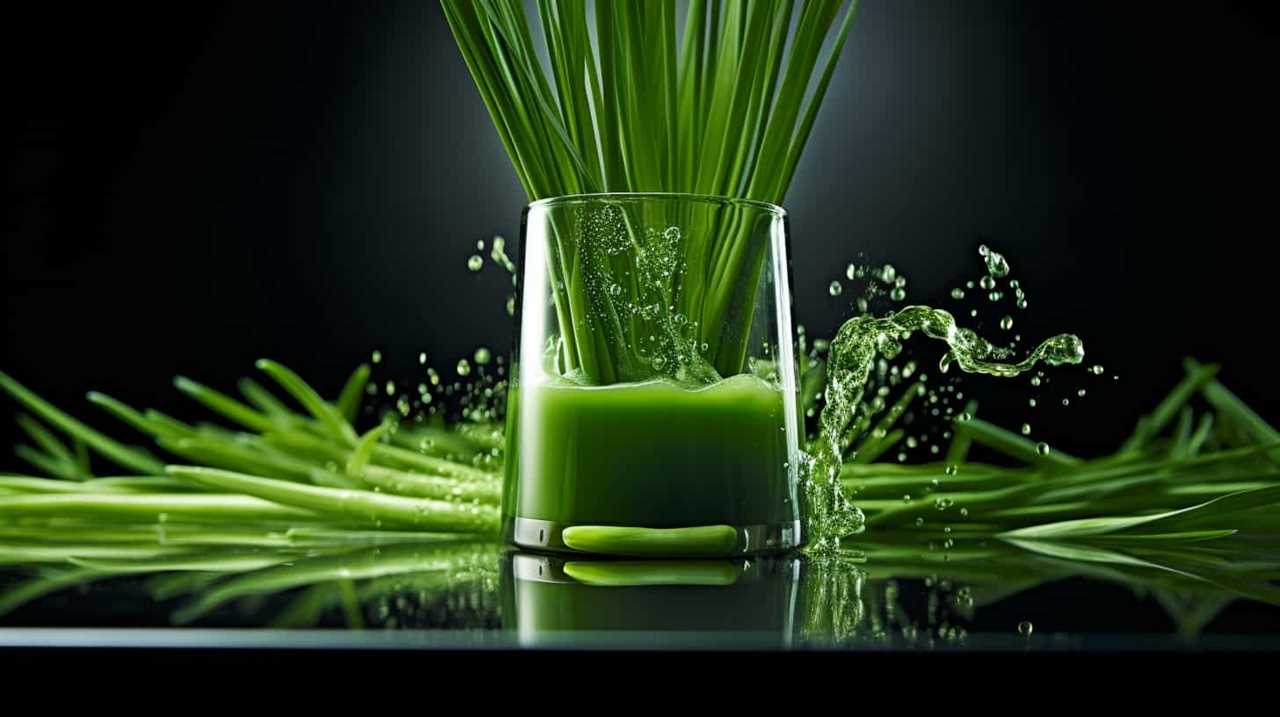
Now, let’s move on to discuss the texture changes in orange juice.
Texture Changes in Orange Juice
As we explore the texture changes in orange juice, it’s important to note that certain factors can cause it to become thicker or develop sediment. One common texture change in orange juice is pulp separation, where the pulp separates from the liquid and settles at the bottom. This can occur naturally over time, as the pulp particles become denser and sink.
Another factor that can affect the texture of orange juice is the expiration date. As orange juice ages, it may start to develop a thicker consistency and even form sediment. This is a result of the natural breakdown of the juice’s components. Therefore, it’s crucial to check the expiration date on orange juice and consume it before it reaches its expiration date to avoid any undesirable texture changes.
Mold or Growth in Orange Juice
We need to be aware of the possibility of mold or other growth occurring in orange juice. Mold can develop in orange juice if it isn’t stored properly or if it has passed its expiration date.
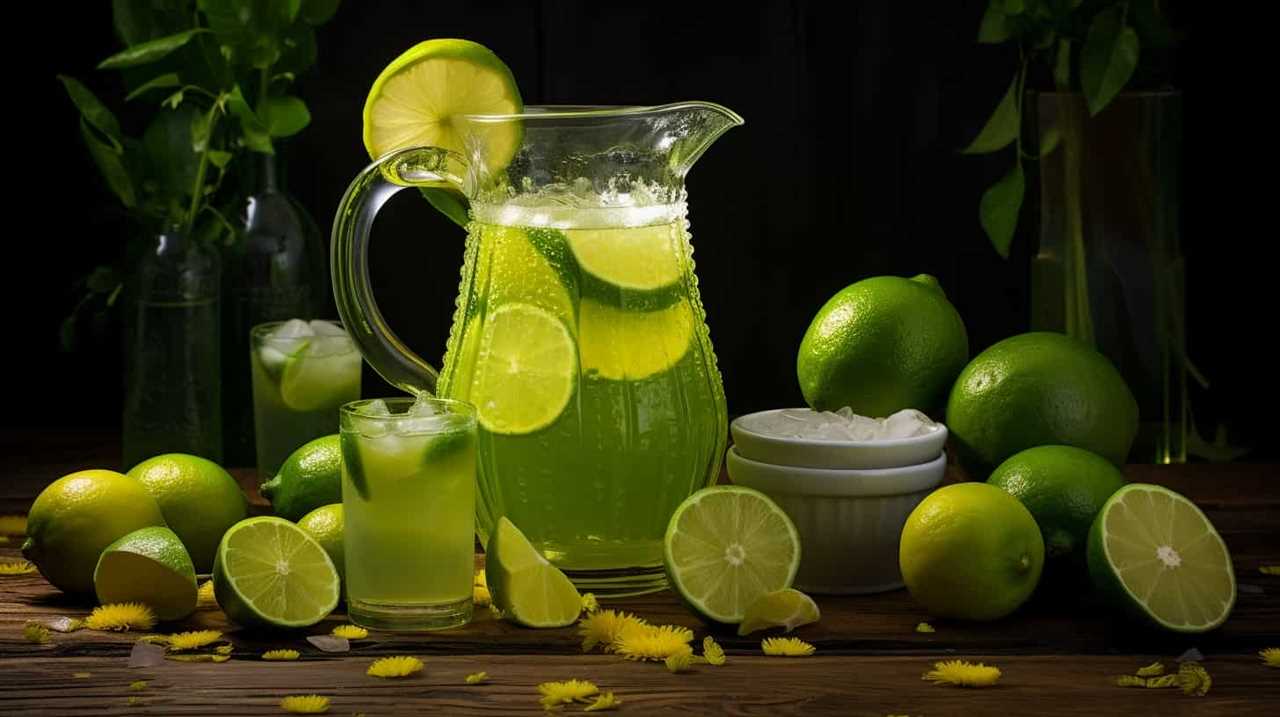
To prevent mold growth, it’s important to follow these steps:
- Store orange juice in the refrigerator at a temperature below 40°F (4°C).
- Check the expiration date on the bottle before consuming. Discard any orange juice that has expired.
- Keep the container tightly sealed to prevent air and moisture from entering, as these can promote mold growth.
Regularly inspecting orange juice for any signs of mold or unusual growth is essential. If you notice any discoloration, a strange odor, or visible mold, it’s best to discard the juice to avoid any potential health risks.
Frequently Asked Questions
Can Orange Juice Go Bad if It’s Stored in the Freezer for Too Long?
Frozen orange juice can potentially lose its nutrients and change its taste if stored in the freezer for too long. It is important to check for signs of spoilage before consuming it.
How Long Can Orange Juice Stay Fresh in the Refrigerator Once It’s Opened?
Once opened, orange juice can stay fresh in the refrigerator for about 7-10 days. To maintain its freshness, store it properly by keeping it tightly sealed and at a consistently cold temperature.
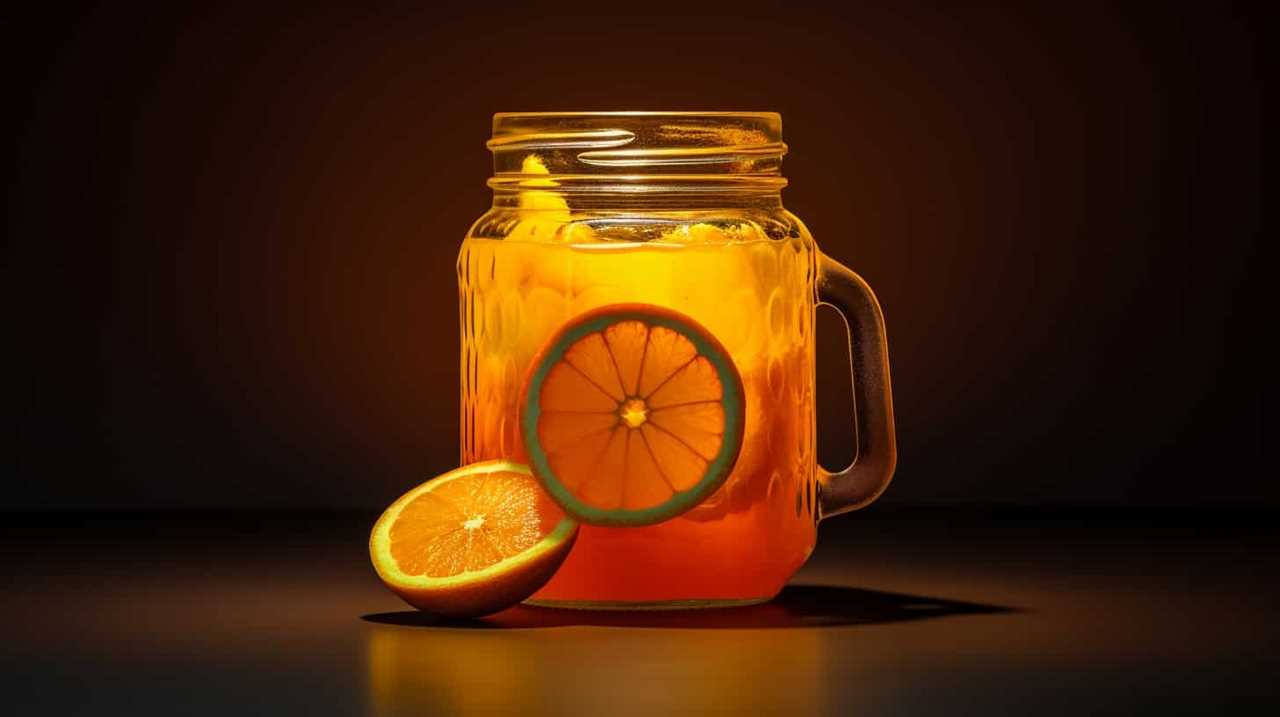
Is It Safe to Consume Orange Juice That Has Been Left Out at Room Temperature Overnight?
Left out orange juice may not be safe to drink as it can harbor harmful bacteria. Signs of spoiled orange juice include a sour smell, mold growth, and a change in color or taste.
Can Orange Juice Develop Harmful Bacteria if It’s Past Its Expiration Date but Still Looks and Smells Fine?
Orange juice can cause food poisoning if it develops harmful bacteria, even if it looks and smells fine. Signs of spoiled orange juice include a sour smell, mold growth, and a change in color or taste.
Does the Nutritional Value of Orange Juice Decrease as It Starts to Go Bad?
As orange juice goes bad, its nutritional value decreases. The longer it sits on the shelf, the more nutrients it loses. Signs of spoilage include a sour smell, off taste, and mold growth.
Conclusion
In conclusion, determining if orange juice is bad requires careful observation of color changes, strange smells, off taste, and texture changes. Just like a detective investigating a case, we must rely on our senses to detect any signs of spoilage.
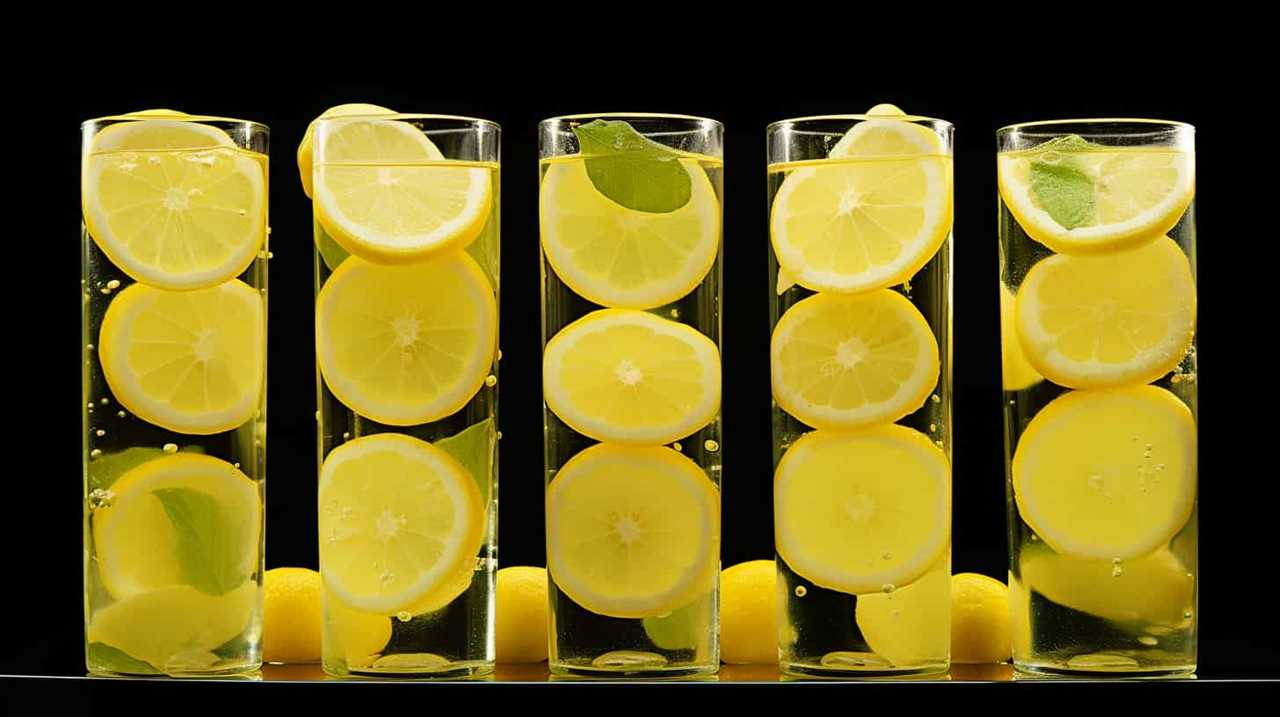
If we detect mold or growth in the orange juice, it’s a clear indication that it’s no longer safe to consume. By remaining vigilant and attuned to these indicators, we can ensure that our orange juice is always fresh and enjoyable.
Susannah expertise lies in researching and compiling evidence-based content on juicing, nutrition, and overall health. She is committed to ensuring that The Juicery World offers accurate, up-to-date, and trustworthy information to empower readers to take control of their health. Susannah’s goal is to inspire individuals to embrace juicing as a way to nourish their bodies and live their best lives.
-

 Juice Tips and Tricks3 months ago
Juice Tips and Tricks3 months agoHow Much Lemon Juice Is Equal To Half A Lemon
-

 Juice Tips and Tricks3 months ago
Juice Tips and Tricks3 months agoHow Much Lemon Juice Concentrate Equals One Lemon
-

 Juice Tips and Tricks3 months ago
Juice Tips and Tricks3 months agoHow Long Can You Drink Orange Juice After The Expiration Date
-

 Fruit Juice Varieties2 months ago
Fruit Juice Varieties2 months agoTop 11 Most Loved Fruit Juice Varieties
-

 Juice Tips and Tricks3 months ago
Juice Tips and Tricks3 months agoHow Much Lemon Juice Is Equivalent To 1 Lemon
-

 Organic and Natural Juices2 months ago
Organic and Natural Juices2 months ago8 Best Organic Brands for Fruit Juice
-

 Juice Tips and Tricks3 months ago
Juice Tips and Tricks3 months agoHow Much Lemon Juice Is Equivalent To One Lemon
-

 Juice Tips and Tricks3 months ago
Juice Tips and Tricks3 months agoHow Long Do You Need To Drink Pineapple Juice Before Oral









